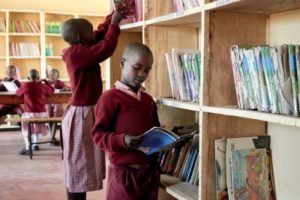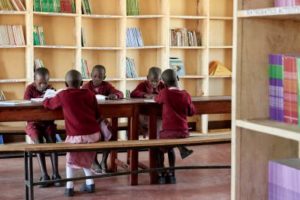
JOHN ROZENTALS looks at Sanctuary Retreat’s efforts to lift the drinking-water standards of school children in Kenya’s Masai Mara.
Boutique luxury travel operator Sanctuary Retreats is a company that has long been committed to conservation and responsible tourism ever since opening its first camp in the Masai Mara in 1999.
The company had always endeavoured to build long-lasting relationships with communities in the areas in which it operates, making a point of identifying and supporting enduring, viable and self-sustaining projects.
“Our aim is to ensure that all projects are supported by our staff and guests, and we work closely with communities to identify their needs, so we can deliver outcomes that really have an impact,” said Michael McCall, the company’s Director of Sales, Australia, NZ & Asia.

The results 1: school children who can use the library.
One of the projects of which the company is particularly proud is its Safe Water for Schools initiative in Kenya’s Masai Mara.
Suffering from avoidable health problems has become a tragic way of life in many developing countries, with millions of people challenged by the burden of infectious disease, malnutrition, and health complications simply because they do not have access to clean drinking water.
Together with its guests, for the past few years Sanctuary Retreats Philanthropy has been working toward eliminating these problems among Kenya’s Maasai children at least — a demographic whose health inequalities continue to be persistent and pervasive.

The results 2: school children who can study.
So far, as part of the Safe Water for Schools Initiative, Sanctuary Retreats Philanthropy has provided the LifeStraw community filter, a high-volume water purifier designed to deliver safe drinking water, to 11 Maasai schools.
The filter’s hollow-fibre purification technology converts contaminated water into safe drinking water by removing almost 100 per cent of bacteria, viruses and parasites, making it instrumental in preventing waterborne diseases common in Africa, like diarrhoea, typhoid, cholera, worms, and cryptosporidiosis.
With each filtration system capable of purifying between 70,000 to 100,000 litres of chemical-free water (enough to serve a school for three to five years), without resort to electrical power or batteries, the introduction of the filter into Maasai schools has proven revolutionary.
Not only has it improved nutrition in those schools where it has been already introduced, it has also proven effective in helping to prevent stunted growth and malnutrition in children who are particularly vulnerable to waterborne illnesses and diarrhoea.

The means: the LifeStraw community filter.
Communities where the filters have been introduced have also benefited economically, thanks to a reduction in pressure on the cost of running medical clinics.
The ready access to clean water has also helped increase productivity of school children and staff by reducing absenteeism from sicknesses.
As part of Sanctuary Retreats Philanthropy’s long-term commitment to the Maasai community going forwards, the Safe Water for Schools Initiative is using mobile-phone technology to conduct quarterly surveys of all schools participating in the program to ensure that schools continue to practise good health and hygiene, and to monitor the ongoing benefits of the program.















